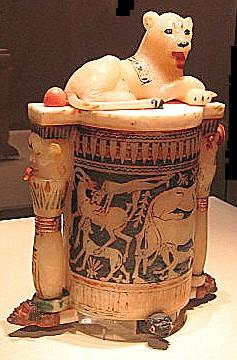Bast (Egyptian deity)
Enlarge text Shrink text
Information for Authority record
Other Identifiers
Wikidata:
Q129106
Sources of Information
- Work cat: Constantine S. Bast and Sekhemet, c1999:p. 28 (Bast was worshipped from the most ancient times and her earliest form is lioness-headed)
- Britannica Macro., c1976:v. 6, p. 505 (Bast, alternative names, Bastet, Ubasti, goddess of music, dance; originally symbolized the fertilizing warmth of the sun; during the new kingdom thought to be a lioness war goddess)
- Kauffman, D.T. The dictionary of religious terms, c1967:p. 64 (Bast, Egyptian cat goddess)
- Per-bast.org WWW site, 28 Jan. 2000:introduction (site dedicated to the dissemination of information on Bast, the feline-headed goddess of ancient Egypt)
1 / 5
Wikipedia description:
Bastet (Ancient Egyptian: bꜣstt), also known as Ubasti, or Bubastis, is a goddess of ancient Egyptian religion possibly of Nubian origin, worshipped as early as the Second Dynasty (2890 BC). In ancient Greek religion, she was known as Ailuros (Koinē Greek: αἴλουρος, lit. 'cat'). Bastet was worshipped in Bubastis in Lower Egypt, originally as a lioness goddess, a role shared by other deities such as Sekhmet. Eventually Bastet and Sekhmet were characterized as two aspects of the same goddess, with Sekhmet representing the powerful warrior and protector aspect, and Bastet, who increasingly was depicted as a cat, representing a gentler aspect.
Read more on Wikipedia >
 Personality
Personality





